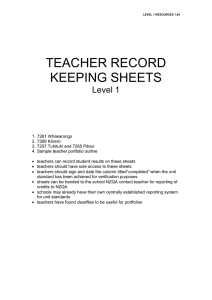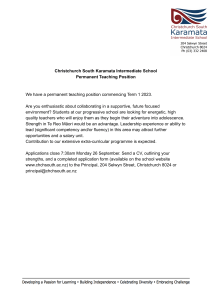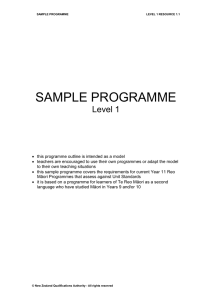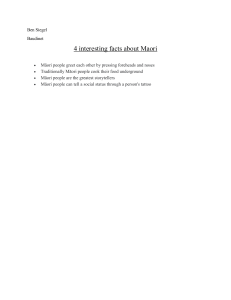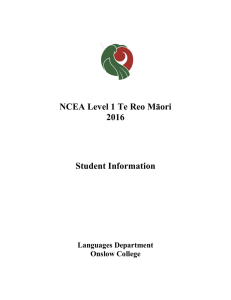Te Reo Māori Speaking Assessment Resource (Level 1)
advertisement
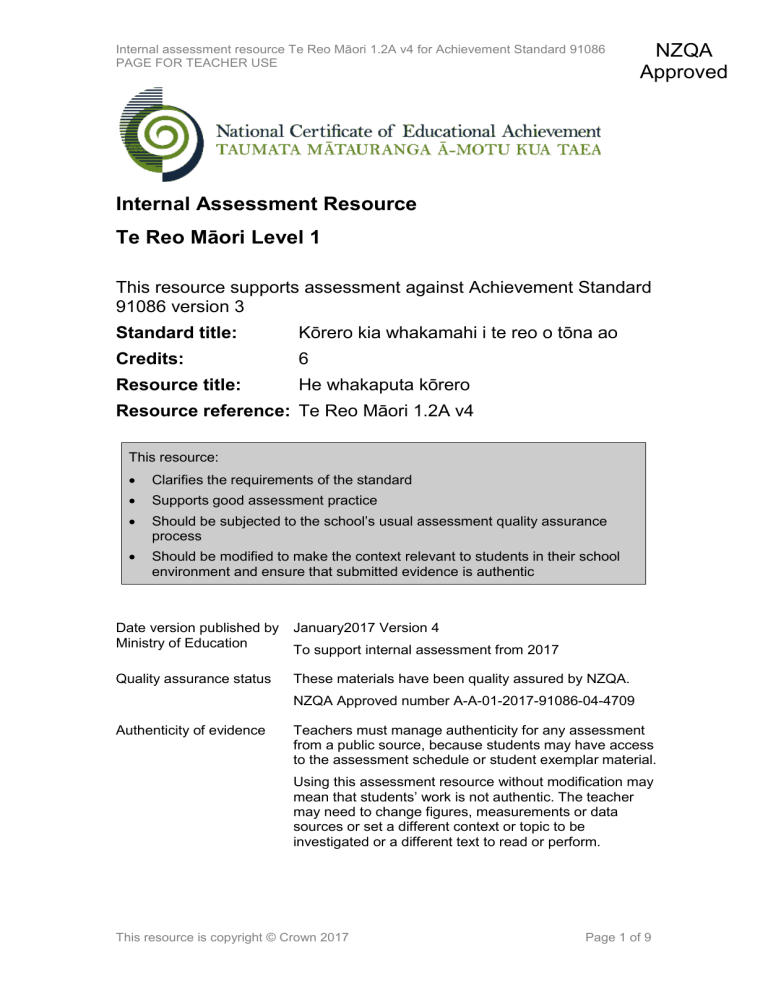
Internal assessment resource Te Reo Māori 1.2A v4 for Achievement Standard 91086 PAGE FOR TEACHER USE NZQA Approved Internal Assessment Resource Te Reo Māori Level 1 This resource supports assessment against Achievement Standard 91086 version 3 Standard title: Kōrero kia whakamahi i te reo o tōna ao Credits: 6 Resource title: He whakaputa kōrero Resource reference: Te Reo Māori 1.2A v4 This resource: Clarifies the requirements of the standard Supports good assessment practice Should be subjected to the school’s usual assessment quality assurance process Should be modified to make the context relevant to students in their school environment and ensure that submitted evidence is authentic Date version published by Ministry of Education January2017 Version 4 Quality assurance status These materials have been quality assured by NZQA. To support internal assessment from 2017 NZQA Approved number A-A-01-2017-91086-04-4709 Authenticity of evidence Teachers must manage authenticity for any assessment from a public source, because students may have access to the assessment schedule or student exemplar material. Using this assessment resource without modification may mean that students’ work is not authentic. The teacher may need to change figures, measurements or data sources or set a different context or topic to be investigated or a different text to read or perform. This resource is copyright © Crown 2017 Page 1 of 9 Internal assessment resource Te Reo Māori 1.2A v4 for Achievement Standard 91086 PAGE FOR TEACHER USE Internal Assessment Resource Achievement standard: 91086 Standard title: Kōrero kia whakamahi i te reo o tōna ao Credits: 6 Resource title: He whakaputa kōrero Resource reference: Te Reo Māori 1.2A v4 Teacher guidelines The following guidelines are supplied to enable teachers to carry out valid and consistent assessment using this internal assessment resource. Teachers need to be very familiar with the outcome being assessed by the achievement standard. The achievement criteria and the explanatory notes contain information, definitions, and requirements that are crucial when interpreting the standard and assessing students against it. Context/setting This assessment activity gives students the opportunity to demonstrate their ability in both speeches and conversations. At this level, students are required to give short talks in familiar contexts on familiar topics that relate to the past and present. The speech is a presentation on a topic of the student’s choice. A variety of contexts and scenarios are possible, and the selection will depend on your teaching programme and the interests and needs of your students. The focus for the presentation is on quality not quantity; however, in order to be able to measure the quality of the presentations, they should be at least two minutes in length. Students can begin their presentation with a mihi but this should not be included for assessment. At this level, a conversation requires a student to be able to initiate and maintain an interaction in formal and/or informal contexts. Each person’s contribution should be at least one minute in length and each will be assessed individually. Conditions The total length of student speaking across the two samples should be a minimum of three minutes. Preparation may take place during class time and at home. Students should have the opportunity to receive feedback, edit, and revise their speaking samples before final recording for submission. You can validly make suggestions about areas where further development is needed, but constructive feedback should not compromise the authenticity of students' work. This resource is copyright © Crown 2017 Page 2 of 9 Internal assessment resource Te Reo Māori 1.2A v4 for Achievement Standard 91086 PAGE FOR TEACHER USE You cannot give detailed written or verbal feedback about individual errors that occur throughout the sample of speaking. You can make use of peer feedback as part of the formative process. You will need to consider all the speaking evidence a student submits in order to make a holistic judgement about their grade. Recordings must be audiovisual. A system needs to be devised for the collection and digital storage of speaking evidence. Resource requirements Video camera and tripod. Computer / data projector if required. Dictionaries. Language texts or grammar reference books. Additional information The activities can be modified to meet the interests of students and their communities. Other ideas for assessment activities can be found on page 63 of the Guidelines for Teaching and Learning Te Reo Māori in English-medium schools http://tereomaori.tki.org.nz/Curriculum-guidelines. This resource is copyright © Crown 2017 Page 3 of 9 Internal assessment resource Te Reo Māori 1.2A v4 for Achievement Standard 91086 PAGE FOR STUDENT USE Internal Assessment Resource Standard title: Kōrero kia whakamahi i te reo o tōna ao Credits: 6 Resource title: He whakaputa kōrero Resource reference: Te Reo Māori 1.2A v4 Student instructions Introduction Tēnā koe e te ākonga This assessment activity requires you to show evidence of you speaking in te reo Māori and to submit at least two pieces for assessment. These will be recorded for assessment and moderation purposes. You are going to be assessed on how confidently you can speak on a range of familiar topics. Your speaking evidence should demonstrate that you can communicate personal information, facts, and personal perspectives. Interaction / conversations may not be pre-scripted. You may use prompts such as photos, maps, diagrams but cue cards or working off prepared scripts is not permitted. Your evidence will add up to a combined total of at least three minutes across the submitted examples. You may choose to submit either conversations or speeches or a combination of both. The work you submit must be your own. You cannot repeat a sample of speaking that someone else has created. Your teacher will give you regular feedback and feed-forward to support your learning. There may also be the opportunity for peer feedback. Collection of speaking evidence will take place throughout the year. The following instructions provide you with a way to structure your work to demonstrate what you have learnt to allow you to achieve success in this standard. Teacher note: Insert the final date for submission here. Task Choose at least TWO of the following speaking activities to complete: Talking about your childhood Share a special story about your childhood or family history. You could talk about: an early school memory an important change in your history, for example, moving countries, moving from a rural to urban lifestyle a humorous family tale This resource is copyright © Crown 2017 Page 4 of 9 Internal assessment resource Te Reo Māori 1.2A v4 for Achievement Standard 91086 PAGE FOR STUDENT USE a family taonga Dream event You are entering an online competition to win tickets to your dream event (a concert, gaming convention, sports event). You need to create a video clip stating why you should win the tickets. You might mention: why you want to go why you deserve to win who you would take with you and why Make sure your video is unique and would capture the attention of the judges. Where to go You are planning to go out with your friend but you both want to go to different events. You need to find a solution that you are both happy with. discuss what each person wants to do and why you both need to say why your suggestion works better include problems and solutions around finances, permission and / or obligations. The School ball / dance The school ball / dance has just come and gone. In a small group, share your experiences and views. Maybe it was a roaring success and you were there and agree or disagree. What could next year’s organising committee change? You could, for example, discuss: • the choice of venue and theme / decorations • the choice of music • the atmosphere, clothes • the dancing • surprises, problems and solutions • how it could be improved in the future. Instead of the school ball, you could discuss any other school event. For example, Stage Challenge, rugby or basketball final, kapa haka competition, annual sports exchange, the school production, Shakespeare competition. Manuhiri You are to prepare or offer food and drink to a guest. You could discuss with a friend: how to go about preparing the dish This resource is copyright © Crown 2017 Page 5 of 9 Internal assessment resource Te Reo Māori 1.2A v4 for Achievement Standard 91086 PAGE FOR STUDENT USE what you are/ have prepared your particular food / drink preferences the role of food in manaaki tangata. Playing a board / computer/ traditional Māori game You introduce a (board / computer / traditional) game with the rules to another person. You could: explain what the game is about demonstrate the rules help your opponent play provide a short commentary enquire about what help is needed. My town Create a promotional video to entice people to visit your town. You could talk about: where the town is what there is to see and do there what young people can do there events / celebrations / people unique to the area your special recommendation or feelings about the place. School You have been asked to give a presentation at the local intermediate to prospective Year 9 students. The purpose of the speech is to promote your school. You could talk about: the history and traditions of your school unique subjects and activities available other special features why you would recommend the school. A trip or holiday Talk about a holiday or trip you have made. You could talk about: where you went how you got there what you saw and did there This resource is copyright © Crown 2017 Page 6 of 9 Internal assessment resource Te Reo Māori 1.2A v4 for Achievement Standard 91086 PAGE FOR STUDENT USE where you stayed and how long a favourite moment or problem that occurred a souvenir or special memento. A sport or hobby Talk about your favourite sport or extracurricular activity. You could talk about: how long you have been doing it what you enjoy about it what skills are required to be successful in this sport or activity any successes or challenges how it has helped you what your future ambitions for this sport / activity are. Teacher note: These topics can be adapted to align with your teaching programme as long as they meet the Achievement Objectives of Level 6. You will be assessed on the quality of your speaking, which includes the way you: use language to communicate information, ideas and opinions develop your ideas using explanations, relevant details and examples use language appropriate to the task speak clearly and audibly using natural pronunciation, stress, rhythm, and intonation speak confidently without significant pauses. This resource is copyright © Crown 2017 Page 7 of 9 Internal assessment resource Te Reo Māori 1.2A v4 for Achievement Standard 91086 PAGE FOR TEACHER USE Assessment schedule: Te Reo Māori 91086 - He whakaputa kōrero Evidence/Judgements for Achievement Evidence/Judgements for Achievement with Merit Evidence/Judgements for Achievement with Excellence Kōrero kia whakamahi i te reo o tōna ao. Kōrero kia whai kiko i te reo o tōna ao. Kōrero kia whai hua i te reo o tōna ao. The student speaks on a range of familiar topics by: The student speaks convincingly on a range of familiar topics by: The student speaks confidently on a range of familiar topics by: providing a minimum of two examples of speaking in te reo Māori from a range of different contexts and for different purposes speaking for a minimum total of three minutes across the two examples speaking audibly using natural pronunciation, stress, rhythm and intonation most of the time communicating main ideas that are relevant to the topic demonstrating use of Curriculum level 6 communication skills, language, and cultural knowledge that are appropriate for the task and the intended audience. speaking on the topic without pauses that significantly affect fluency. providing a minimum of two examples of speaking in te reo Māori from a range of different contexts and for different purposes speaking for a minimum total of three minutes across the two examples speaking audibly using natural pronunciation, stress, rhythm and intonation communicating main ideas that are relevant to the topic and developing some ideas using details or examples demonstrating use of Curriculum level 6 communication skills, language, and cultural knowledge that are appropriate for the task and the intended audience. speaking on the topic without pauses that significantly affect fluency. providing a minimum of two examples of speaking in te reo Māori from a range of different contexts and for different purposes speaking for a minimum total of three minutes across the two examples speaking audibly using natural pronunciation, stress, rhythm and intonation communicating main ideas that are relevant to the topic and effectively developing ideas using details or examples demonstrating use of Curriculum level 6 communication skills, language, and cultural knowledge that are appropriate for the task and the intended audience. confidently speaking on the topic without pauses that significantly affect fluency. The communication of ideas is achieved overall; minor errors do not hinder the understanding of the listener. The communication of ideas is confident and fluid; minor errors do not hinder the understanding of the listener. For example the student says in the favourite sport task: For example, the student says in the favourite sport task. I te tīmatanga, kāore i te tino pai ōku pūkenga poitūkohu. Nā tēnei, he uaua ki te tūpana i te pōro. Engari, ia rā ka parakitihi ahau. The communication of ideas is achieved overall, although errors in language may hinder the understanding of the listener in places. For examplethe student says in the favourite sport task: Ko te potūkohu taku tino hākinakina. Ki ahau, he rawe te kēmu. He mema ahau nō te tīma o te kura mō ngā tau e toru. The examples above are indicative samples only. This resource is copyright © Crown 2017 Tekau tau taku pakeke i te wā ka timata ahau ki te pūrei poitūkohu. He mema taku matua me ōku tuakana nō tētahi karapu. I haere te whānau katoa ki te tautoko i a rātou. Page 8 of 9 Internal assessment resource Te Reo Māori 1.2A v4 for Achievement Standard 91086 PAGE FOR TEACHER USE The examples above are indicative samples only. The examples above are indicative samples only. Final grades will be decided using professional judgement based on a holistic examination of the evidence provided against the criteria in the Achievement Standard. This resource is copyright © Crown 2017 Page 9 of 9
